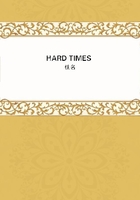
第36章 FATHER AND DAUGHTER(1)
ALTHOUGH Mr. Gradgrind did not take after Blue Beard, his room was quite a blue chamber in its abundance of blue books. Whatever they could prove (which is usually anything you like), they proved there, in an army constantly strengthening by the arrival of new recruits. In that charmed apartment, the most complicated social questions were cast up, got into exact totals, and finally settled - if those concerned could only have been brought to know it. As if an astronomical observatory should be made without any windows, and the astronomer within should arrange the starry universe solely by pen, ink, and paper, so Mr. Gradgrind, in his Observatory (and there are many like it), had no need to cast an eye upon the teeming myriads of human beings around him, but could settle all their destinies on a slate, and wipe out all their tears with one dirty little bit of sponge.
To this Observatory, then: a stern room, with a deadly statistical clock in it, which measured every second with a beat like a rap upon a coffin-lid; Louisa repaired on the appointed morning. Awindow looked towards Coketown; and when she sat down near her father's table, she saw the high chimneys and the long tracts of smoke looming in the heavy distance gloomily.
'My dear Louisa,' said her father, 'I prepared you last night to give me your serious attention in the conversation we are now going to have together. You have been so well trained, and you do, I am happy to say, so much justice to the education you have received, that I have perfect confidence in your good sense. You are not impulsive, you are not romantic, you are accustomed to view everything from the strong dispassionate ground of reason and calculation. From that ground alone, I know you will view and consider what I am going to communicate.'
He waited, as if he would have been glad that she said something.
But she said never a word.
'Louisa, my dear, you are the subject of a proposal of marriage that has been made to me.'
Again he waited, and again she answered not one word. This so far surprised him, as to induce him gently to repeat, 'a proposal of marriage, my dear.' To which she returned, without any visible emotion whatever:
'I hear you, father. I am attending, I assure you.'
'Well!' said Mr. Gradgrind, breaking into a smile, after being for the moment at a loss, 'you are even more dispassionate than Iexpected, Louisa. Or, perhaps, you are not unprepared for the announcement I have it in charge to make?'
'I cannot say that, father, until I hear it. Prepared or unprepared, I wish to hear it all from you. I wish to hear you state it to me, father.'
Strange to relate, Mr. Gradgrind was not so collected at this moment as his daughter was. He took a paper-knife in his hand, turned it over, laid it down, took it up again, and even then had to look along the blade of it, considering how to go on.
'What you say, my dear Louisa, is perfectly reasonable. I have undertaken then to let you know that - in short, that Mr. Bounderby has informed me that he has long watched your progress with particular interest and pleasure, and has long hoped that the time might ultimately arrive when he should offer you his hand in marriage. That time, to which he has so long, and certainly with great constancy, looked forward, is now come. Mr. Bounderby has made his proposal of marriage to me, and has entreated me to make it known to you, and to express his hope that you will take it into your favourable consideration.'
Silence between them. The deadly statistical clock very hollow.
The distant smoke very black and heavy.
'Father,' said Louisa, 'do you think I love Mr. Bounderby?'
Mr. Gradgrind was extremely discomfited by this unexpected question. 'Well, my child,' he returned, 'I - really - cannot take upon myself to say.'
'Father,' pursued Louisa in exactly the same voice as before, 'do you ask me to love Mr. Bounderby?'
'My dear Louisa, no. No. I ask nothing.'
'Father,' she still pursued, 'does Mr. Bounderby ask me to love him?'
'Really, my dear,' said Mr. Gradgrind, 'it is difficult to answer your question - '
'Difficult to answer it, Yes or No, father?
'Certainly, my dear. Because;' here was something to demonstrate, and it set him up again; 'because the reply depends so materially, Louisa, on the sense in which we use the expression. Now, Mr.
Bounderby does not do you the injustice, and does not do himself the injustice, of pretending to anything fanciful, fantastic, or (Iam using synonymous terms) sentimental. Mr. Bounderby would have seen you grow up under his eyes, to very little purpose, if he could so far forget what is due to your good sense, not to say to his, as to address you from any such ground. Therefore, perhaps the expression itself - I merely suggest this to you, my dear - may be a little misplaced.'
'What would you advise me to use in its stead, father?'